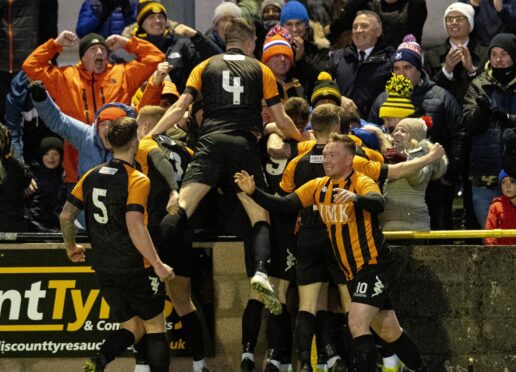
It is a consolation of life that even your rivals will sometimes do you a good turn. However inadvertently.
Scotland’s women trudged off the pitch at the end of their 8-0 defeat by Spain in the World Cup qualifiers on Tuesday night to be met by a bit of news that at least helped put their result in context.
England’s tie had kicked off an hour earlier, and they had stuck a dozen more goals past Latvia, their hapless opponents unable even to muster a shot on target during their 20-0 mauling by the Lionesses.
Their male counterparts may have won 10-0 in San Marino recently. But the sheer scale of that success sparked discussion on the importance of competitiveness – and not just in the international women’s game.
With Scotland’s conquerors now having won 16 games in a row, scoring 96 goals and conceding zero, the imbalance looks clear.
By and large, however, the men’s game looks more-competitive than ever.
Steve Clarke’s Scotland held the Auld Enemy to a draw at Wembley during last summer’s Euros, and now have the World Cup play-offs to look forward to next March.
Ukraine at Hampden, followed – should they win that one – by the winners of Wales v Austria in the final is far from a gimme.
At the same time, thanks to a run of six straight wins – the most-recent the thrilling win over Denmark, who themselves had won all nine of their previous Group F fixtures – every Scotland fan can be cheerfully optimistic.
Until then, and there will be no warm-up friendlies, it will be all about the club game, which is likewise looking in good shape.
If there is one particular weekend in the entire campaign where one-sided victories could reasonably be expected, it is in the third round of the Scottish Cup.
A scattering of sides from the East, West and North Juniors, along with Lowland League clubs and Brechin City from the Highland League, went up against senior clubs up to Championship level.
On paper, there should have been a good few mismatches.
But while Alloa’s 5-0 win over Bonnyrigg Rose was the biggest of the round, elsewhere it was a very different story.
Auchinleck Talbot shocked Hamilton Accies, a side who play four tiers above them, to earn the prize of a fourth-round tie at home to Hearts.
Equally eye-catching was Aberdeen junior team, Banks o’ Dee’s victory over East Fife, whose Cup exit added more misery on top of their struggles in League One this year.
And if Clydebank’s defeat of Clyde had a more familiar ring to it, that was only because of the pair’s shared history back when the Bankies were a prominent member of the senior set-up.
Combined, the results showed there is plenty of life to be found below League Two.
We are all too quick to believe the SPFL is the be-all-and-end-all.
But the strength of teams below the top four tiers shows that all the player-development schemes the Scottish FA have initiated in recent years have had a drip-down benefit for the game as a whole.
A player may have been deemed not good enough to cut it with the big boys, but he can still have his day in the sun when the Scottish Cup comes around.
The list of Cup shocks were also a further vindication of the 2007 move to allow Junior teams to compete in our premier knock-out competition.
All logic suggests Hearts, a powerhouse of the Scottish game, will prove too strong for Talbot next up. But the alluring David-versus-Goliath romance of the tie is undeniable.
The Premiership cannot provide such exotic contests but it is doing a great job of entertaining this season with its sheer competitiveness making it anything but predictable.
Last midweek’s action summed it up.
Rangers, blown away by Hibs in the Premier Sports Cup semi-final, gained three points plus a measure of revenge by beating the Edinburgh side at Easter Road.
Dundee, turned over in the league and cup by St Johnstone in the clubs’ last two meetings, bounced back with what was their second- successive win.
St Mirren, who won a five-goal thriller against Ross County in the Highlands, were held to a goalless draw at home.
Heading into the Christmas and New Year rush of fixtures ahead of the winter break, the top flight is tight at the top, the middle and at the bottom.
There is no runaway leader and no straggler detached at the bottom pile.
And at a time when the spectre of coronavirus playing havoc with plans – on and off the pitch – is looming large again, that alone has to be a cause for celebration.

Enjoy the convenience of having The Sunday Post delivered as a digital ePaper straight to your smartphone, tablet or computer.
Subscribe for only £5.49 a month and enjoy all the benefits of the printed paper as a digital replica.
Subscribe